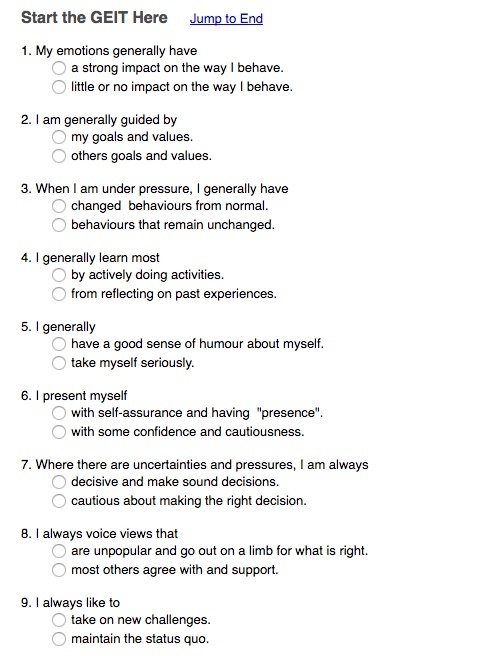What Is Emotional Intelligence?
The Global Emotional Intelligence Test (GEIT) is based on Daniel Goleman’s four quadrant Emotional Intelligence Competency Model (2002). Emotional intelligence is the ability to recognise, understand and manage emotions in ourselves and others. Goleman divides Emotional Intelligence into four clusters or quadrants known as of Self-Awareness, Self-Management, Social Awareness and Relationship Management (also popularly known as “people skills”). To read in detail what each cluster reflects after you have completed the test, click here.
The GEIT
The GEIT uses 40 questions which are derived from the Global EI Capability Assessment instrument, which contains 158 items. The GEIT, is a forced-choice psychological test which requires you to chose one statement in each pair of statements that describes you best. For each pair of statements, select the statement that best applies to you. It usually takes about 10 minutes to complete the test.
Why is Emotional Intelligence Important?
Goleman’s (1998) findings indicated that Emotional Intelligence contributes 80 to 90% of the competencies that distinguish outstanding leaders from average leaders. Some of the behaviors identified include: – The ability to recognise and understand their own moods, emotions and drives as well as their effect on others; – The ability to control or redirect disruptive impulses, moods and to think before acting; – The passion to work for reasons beyond money or status and the propensity to pursue goals with energy and persistence; – The ability to understand the emotional makeup of other people and the skill in treating people according to their emotional reactions; the proficiency in managing relationships, building networks and the ability to find common ground and build rapport.
You Can Train Up Your EI but Not Your IQ
In professional and technical fields, the typical entry-level threshold IQ is 110 to 120. It is generally considered that your IQ, which is largely genetic, will change little from childhood. Since everyone is in the top 10% or so of intelligence, IQ itself offers relatively little competitive advantage. EI on the other hand can be learned at any age. Growing your competency in EI is not easy or quick, as it takes perseverance in the process of critical self-evaluation, commitment to improvement and of course behavioural practice. It is also important to note, that competence in Emotional Intelligence does not necessarily increase with age as you might expect. Some people may learn from life’s experiences, but many do not. By taking the GEIT, you will have better awareness of where you stand with your EI and this will serve as a guide to which EI areas you are doing well in and those which perhaps you need to focus on for development. Take the Global Emotional Intelligence Test here.
